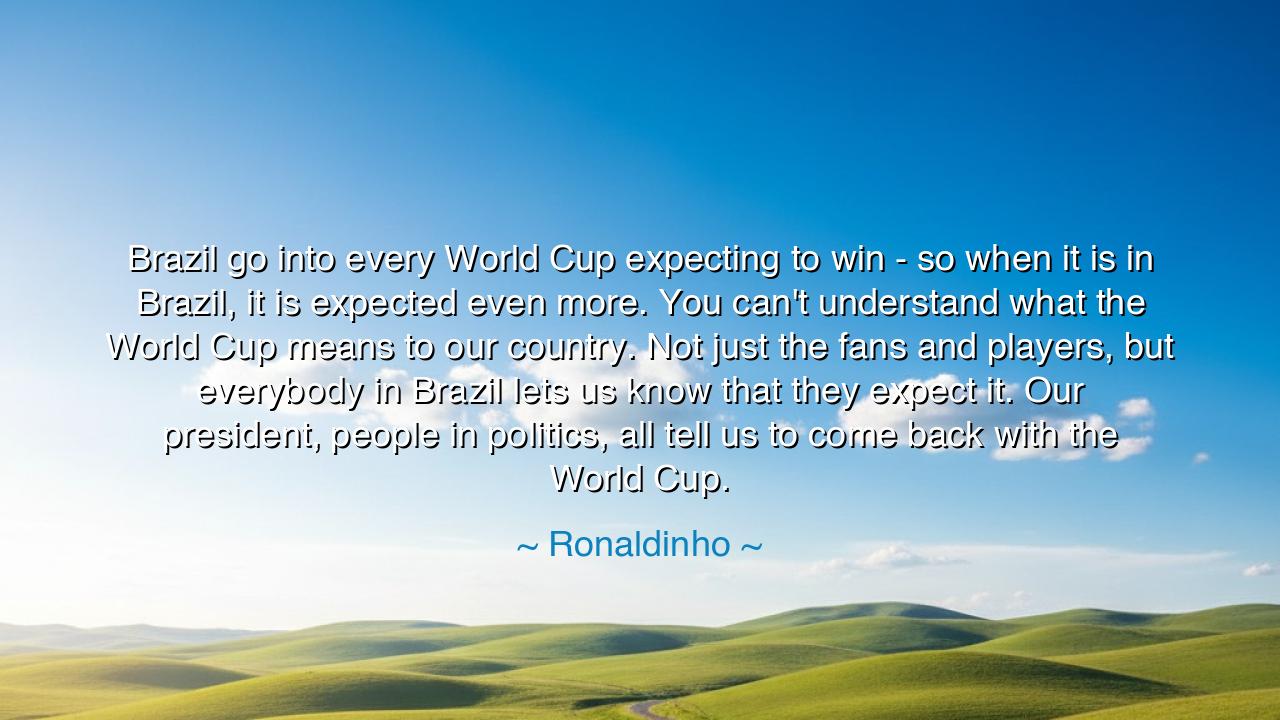
Brazil go into every World Cup expecting to win - so when it is
Brazil go into every World Cup expecting to win - so when it is in Brazil, it is expected even more. You can't understand what the World Cup means to our country. Not just the fans and players, but everybody in Brazil lets us know that they expect it. Our president, people in politics, all tell us to come back with the World Cup.






The words of Ronaldinho, “Brazil go into every World Cup expecting to win – so when it is in Brazil, it is expected even more. You can't understand what the World Cup means to our country. Not just the fans and players, but everybody in Brazil lets us know that they expect it. Our president, people in politics, all tell us to come back with the World Cup,” carry the voice of both pride and burden. They reveal how deeply the spirit of a nation can bind itself to a single pursuit, and how expectation becomes both a crown and a weight upon the heads of its champions.
The ancients knew this rhythm well. In Greece, the Olympic Games were not merely contests of strength, but sacred offerings to the gods. Victors carried not only their own glory, but the honor of their city-states. So too with Brazil and the World Cup—a modern temple where footballers do not play only for themselves, but as vessels of the collective longing of millions. To triumph is to fulfill the dream of a nation; to falter is to feel the sorrow of an entire people.
History itself offers an echo. In 1950, Brazil hosted the World Cup for the first time, entering with the same fiery expectation Ronaldinho describes. Yet in the final, Uruguay defeated them in what became known as the “Maracanazo.” The wound cut so deep that decades later, Brazilians still spoke of it with hushed sorrow. And yet, this pain only deepened the hunger, ensuring that every generation since has entered the tournament not with hope alone, but with a fierce demand for victory.
Ronaldinho’s words remind us also that politics and leadership do not stand apart from sport, but weave themselves into it. When even presidents join in the chorus of expectation, the line between pastime and destiny is erased. Football becomes not just a game, but a vessel of national identity, a mirror of pride, unity, and ambition. The players become more than men; they are bearers of the soul of Brazil.
Let the lesson endure: the greatest glory comes with the heaviest burden. To represent a people is to carry their joy, their history, and their longing on one’s shoulders. Brazil’s story in the World Cup is more than sport—it is myth, sacrifice, and triumph intertwined. And as Ronaldinho teaches, when the weight of millions presses upon you, it is not merely victory that is sought, but the fulfillment of a nation’s dream.






MDmanh dung
Comparatively, some nations carry heavy expectations, but the intensity you describe feels singular. Does that passion offer a competitive edge—stadiums that become fortresses, players lifted by song—or does it tighten muscles at key moments? I’m interested in practices that turn pressure into fuel: controlled exposure to noise levels, penalty rehearsal with biometric monitoring, captains trained in crisis communication. Open question: if you could choose one intervention to convert national passion into performance, would it be fan–team dialogues, leadership counseling, or tactical automatisms drilled for chaos?
VANguyen Van A
Economically, the stakes ripple far beyond the pitch. Small businesses, street vendors, and tourism all ride the tournament wave. That can justify enthusiasm, but it also invites unrealistic promises. How do we measure the true impact of a title chase on everyday livelihoods versus short bursts of spending? I’d love to see citizen dashboards tracking tournament-related jobs, transport upgrades delivered, and community fields built. Closed question: should host-year budgets set aside a fixed percentage for post-cup neighborhood facilities, regardless of results?
LKLinh Khanh
From a supporter’s angle, the constant drumbeat of “must win” can flatten the richness of the sport. I want dazzling improvisation, not fear-driven conservatism. Does relentless pressure push coaches toward risk-averse selections and rigid tactics? I’m curious about balancing style and results: can a federation codify playing principles—creativity, expressive flair—so the team’s identity survives tense moments? Open question: would you endorse selection bonuses for developing young creators domestically, so the national side can persist with daring football even under scorching expectations?
THVY NGUYEN THI HOAI
I can’t help remembering how hosting heightens both magic and risk. When the dream falters—like that semifinal collapse a decade ago—the national mood can swing from carnival to collective heartbreak overnight. What’s the healthy way for a country to metabolize that swing? Maybe ritualized gratitude for the team’s effort, open forums to process disappointment, and redirecting energy into grassroots football so kids keep playing. Closed question: should federations pre-plan community recovery events for worst-case outcomes, treating emotional repair as part of tournament operations?
QTNguyen Quyet Thang
The entanglement of football and politics here makes me uneasy. When leaders publicly demand a trophy, are they elevating morale or displacing accountability from schools, hospitals, and infrastructure onto a result no one can guarantee? I’d love a framework for responsible engagement: cultural support without scapegoating, public celebrations without budgetary excess, and transparent accounting for tournament costs versus benefits. Open question: should politicians commit to a “no blame, no credit” pact during and after competitions, to protect players from being turned into proxies?